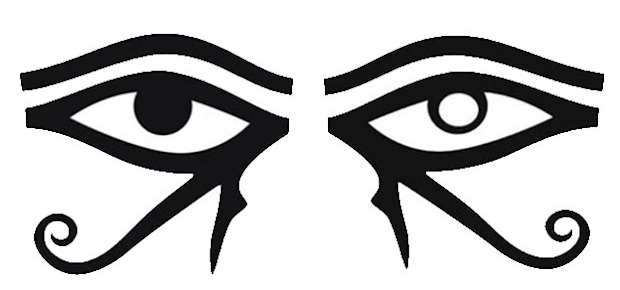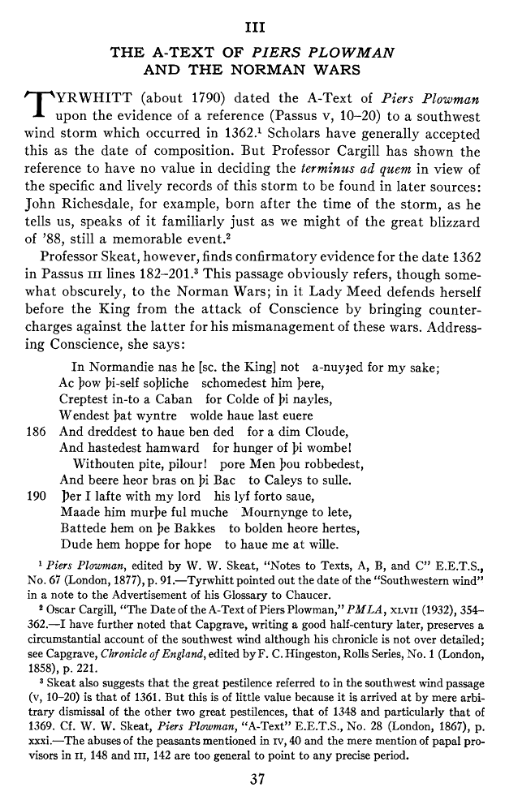1000年前の欧州なんて文明の欠片も無い石器時代の原始人に近いこん棒でどつきあいしてた野蛮人だったんですよ。
Remember 農夫ピアズの幻。
Piers Plowman (written c. 1370–86; possibly c. 1377) or Visio Willelmi de Petro Ploughman (William's Vision of Piers Plowman) is a Middle English allegorical narrative poem by William Langland. It is written in un-rhymed, alliterative verse divided into sections called passus (Latin for "step").
Like the Pearl Poet's Sir Gawain and the Green Knight, Piers Plowman is considered by many critics to be one of the greatest works of English literature of the Middle Ages, preceding and even influencing Chaucer's Canterbury Tales. Piers Plowman contains the first known reference to a literary tradition of Robin Hood tales.[1][2]
There exist three distinct versions of the poem, which scholars refer to as the A-, B-, and C-texts. The B-text is the most widely edited and translated version; it revises and extends the A-text by over four thousand lines.[3]
Summary
The poem, a mix of theological allegory and social satire, concerns the narrator/dreamer's quest for the true Christian life in the context of medieval Catholicism. This journey takes place within a series of dream visions; the dreamer seeks, among other things, the allegorical characters Dowel ("Do-Well"), Dobet ("Do-Better"), and Dobest ("Do-Best"). The poem is divided into passus ('steps'), the divisions between which vary by version.
The following summary is based on the B-version of the poem.
Vision 1
Prologue: The poem begins in the Malvern Hills between Worcestershire and Herefordshire. A man named Will (which can be understood either simply as a personal name or as an allegory for a person's will, in the sense of 'desire, intention') falls asleep and has a vision of a tower set upon a hill and a fortress (donjon) in a deep valley; between these symbols of heaven and hell is a 'fair field full of folk', representing the world of humankind. A satirical account of different sections of society follows, along with a dream-like fable representing the King as a cat and his people as rodents who consider whether to bell the cat.
Passus 1: Holy Church visits Will and explains the tower of Truth, and discusses Truth more generally.
Passus 2: Will sees Lady Mede ('payment') and finds out about her planned marriage to False.
Passus 3: Lady Mede travels to the royal court; the King proposes she marry Conscience; but Conscience denounces her.
Passus 4: Conscience and Reason convince the King not to marry Mede to False. Will wakes up.
Vision 2
Passus 5: Will falls back to sleep. Reason gives a sermon to the Field of Folk and the people decide to repent. The Seven Deadly Sins make confession and in penance attempt to go on pilgrimage to St Truth. They get lost, and Piers Plowman makes his first appearance: he will help the penitents if they help him plough his half-acre.
Passus 6: Piers and the penitents plough the half-acre. Some people refuse to work, and Hunger punishes them until they work. But once Hunger has been sated, the people return to idleness.
Passus 7: Eventually, Truth sends Piers a pardon for the penitents' sins; its main content is 'Do well and have well and God shall have your soul' and 'Do evil and have evil, and expect nothing other than that after your death, the Devil shall have your soul'. When challenged on the pardon's validity by a priest, Piers angrily tears it in two. Will is awakened by their arguing and, musing on his dreams, decides to seek ‘Do-wel’.
Vision 3
Passus 8: Will's search for Dowel begins. He enters into a disputation with Friars. He then falls asleep once more and meets Thought. Thought instructs Will in 'Do well, do better, do best'. Practical interpretation of what these concepts mean is to be provided by Wit.
Passus 9: There is an extended allegory featuring Dowel and the Castle of Flesh, exposing the need for people to be governed by their 'Inwit'. The text discusses poverty and marriage. Wit makes further inroads to understanding Dowel, as active virtue.
Passus 10: Will meets Wit's wife, Dame Study. She complains to Will about his ignorance. Will then proceeds to Clergy and Scripture to learn more about Dowel. He considers what use scholarship might have in helping him achieve salvation.
Passus 11: Scripture complains about Will's lack of self-knowledge. Angered, Will (who is already dreaming) goes to sleep and has a dream-within-a-dream in which he meets Fortune. He serves her into old age, but she abandons him. Will learns about the salvation of the Emperor Trajan and the power of love. Kynde ('character, natural disposition, nature', here understood as an aspect of God) shows Will the world. Will has an argument with Reason: Reason, Will concludes, does not do enough to keep people from sin; but Reason disagrees. Will awakes from the dream-within-a-dream. He now meets Imaginatif, who advises Will to be patient.
Passus 12: Imaginatif teaches Will, bringing together and improving his understanding of earlier discussions in the poem. Imaginatif emphasises the need for humility and the importance of Grace.
Vision 4
Passus 13: Will awakens and then falls back to sleep; he dreams of sharing a feast with Conscience, Scripture, Clergy and Patience; he encounters a greedy Doctor of Divinity (who later shows disdain for love) and as well as eating actual food also dines on spiritual food. Piers the Plowman offers a definition of Do Well, Do Better and Do Best. Then Conscience and Patience meet Haukyn the Active Man, who wears a coat of Christian faith which is, however, soiled with the Seven Deadly Sins.
Passus 14: Conscience teaches Haukyn to seek forgiveness and do penance; Patience teaches Haukyn about the merits of embracing poverty. Haukyn cries out for God's mercy, which awakens Will.
Vision 5
Passus 15: Will finds himself alienated from the waking world, but Reason helps him to go back to sleep, whereupon Will meets Anima ('spirit'). Anima tells Will off for his pride in wanting to know too much, but goes on to talk about charity, in particular how the Church should care for its flock, but how its priests and monks do not always fulfil this duty. Talking to Anima, Will starts to conclude that Piers the Plowman is Christ. Will realises that he needs to switch from searching for Dowel to searching for Charity.
Passus 16: Will falls into another dream-within-a-dream, this time about the Tree of Charity, whose gardener is Piers the Plowman. Will participates in a re-enactment of the Fall of Man and then has a vision of the life of Christ; when this reaches the point where the Devil is defeated, Will wakes up from the dream-within-a-dream. Will goes looking for Piers and meets Faith/Abraham, who is himself searching for Christ.
Passus 17: Next, Will meets Hope/Moses, characterised by the tablets of law, who is also in search of Christ. Will learns about the Good Samaritan, the prospect of salvation, and the importance of Love. He wakes up.
Vision 6
Passus 18: Will sleeps again, and experiences the climactic section of Piers Plowman. He experiences Love and the intersection of human and divine time. Will witnesses Christ/the Good Samaritan/Piers Plowman riding into Jerusalem and Christ's crucifixion. He then witnesses the Four Daughters of God (Truth, Justice, Mercy, Peace) in debate; the Harrowing of Hell; and Redemption.
Will wakes again, and now exhorts his family to hear Mass.
Vision 7
Passus 19: During the mass, Will falls back to sleep and meets Conscience once more. Conscience recounts the life and Passion of Christ and how Piers/Peter was given his power by Grace/Christ. Will finds out about Pentecost; once more sees Piers as a ploughman, and witnesses Pride attacking Unity/Holy Church. He wakes up and records his dream.
Vision 8
Passus 20: While awake, Will meets Need. He falls asleep again and now dreams of the Antichrist. Kynde sends Old Age, Death, and Pestilence, to chastise people: Will is attacked by Old Age. He witnesses Holy Church undermined by a hypocritical Friar. Conscience goes on pilgrimage to seek Piers the Plowman, and calls on Grace for help—whereupon Will wakes up.
ロビン・フッド
ろびんふっど
ロビン・フッド (Robin Hood) は、中世イングランドの伝説上の義賊である。
弓の名手で、中世イギリスのノッティンガムのシャーウッドの森(Sherwood Forest)に住むアウトロー集団の首領とされる。吟遊詩人により一編の物語として編集され、一般に広まる。
ロビン・フッドに類似した名前は、アウトロー(法の保護外の者)の盗賊の代名詞として使われていたようで、13、14世紀のいくつかの文献、資料に登場する。
まとまった物語の存在への言及は、14世紀のウィリアム・ラングランドの長編詩「農夫ピアズの夢」において触れられているのが最古である。歴史書にも名前が登場し、1241年没という伝承もあるが、実在性に関しては確実な資料は存在せず、何人かの実在の人物の伝承が複合して形成された可能性が高い。ヘリワード・ザ・ウェイク(Hereward the Wake)などがモデルとして挙げられている。
当初の伝承は、ノルマン・コンクエスト(Norman Conquest)(ノルマンディー公ギヨーム2世率いるノルマン人によるイングランド征服)後に、ノルマン人に抵抗するサクソン人の非小作農民ヨーマンであり、その後、エドワード1世時代の設定になり、ノルマン人に所領を奪われた貴族、義賊、マリアンとのロマンス、あるいは十字軍帰りなどの設定が加わった。16世紀以降、リチャード1世(獅子心王)時代の人物となり、リチャード1世が十字軍遠征に赴いている間にジョン欠地王の暴政に反抗した人物として描かれるようになった。
おおむね英雄としての評価が定着しているが、ロバート・キヨサキのように「盗人」と呼称し否定的に見ている人もいる。
ロビンフッド(技)
アーチェリーの技の一つで、彼の名前がもとになっている。
いわゆるアーチェリー版のワンホールショットで、刺さった矢にもう一度矢を当てる技。無論難易度は極めて高い。弓道では継ぎ矢と言われている。
ウィリアム・テル(ドイツ語: Wilhelm Tell〔ヴィルヘルム・テル〕、フランス語: Guillaume Tell〔ギヨム・テル[1]〕、イタリア語: Guglielmo Tell〔グリエルモ・テル〕、ロマンシュ語: Guglielm Tell〔グリエルム・テル〕、英語: William Tell)は、スイスの伝説に登場する民衆の英雄で、弓(クロスボウ)の名手。14世紀初頭にスイス中央部のウーリ州アルトドルフに住んだとされ、オーストリア公国(ハプスブルク家)が同地に置いた代官であるゲスラーを暗殺し、これにより民衆の周辺国への反抗が生まれて、シュヴィーツ、ウンターヴァルデンとともにスイス同盟(英語版)の基礎が作られたとされている。彼の名が記された史料が見つかっていないため実在性は証明されていないが、スイス人の6割はテルが実在の人物であると信じている[2]。
日本では長らく英語名に基づいた表記「ウィリアム・テル」が使われており、他にドイツ語名に則した表記「ヴィルヘルム・テル」も用いられている。
14世紀初頭のアルブレヒト1世の時代、スイス同盟が軍事的、および政治的な影響力を強めていたが、当時ハプスブルク家は、神聖ローマ帝国の先君アドルフの時代に強い自治権を獲得していたウーリの支配を強めようとしていた。
テルはゼンパハの戦い(英語版)(1386年)における英雄アルノルト・フォン・ヴィンケリート(英語版)とともにスイス史において並び語られている。テルは、18世紀から19世紀のヨーロッパにおける貴族体制への抵抗の歴史、特に1848年のオーストリア帝国におけるハプスブルク家に対する革命のような、19世紀スイスの形成期における重要なシンボルだった。
テルへの最初の言及は、1474年にオプヴァルデン準州の副大臣ハンス・シュライバー(ドイツ語版)によって書かれた『ザルネンの書(ドイツ語版)』(Weisses Buch von Sarnen) に認められる。これにルトリの誓い(ドイツ語版)について記述があり、Burgenbruch謀反の元となったルトリの共謀者の一人としてテルが挙げられている[3]。
同じ頃の初期の言及は、1470年代に作られた「テルの歌」 (Tellenlied) に見られ、現存する最古の写本は1501年に書かれている。この歌はテルの伝説についてで始まり、テルをスイス同盟の最初の同盟者 (Eidgenossenschaft) と呼んでいる。物語は、テルがリンゴを射抜き、ゲスラーを射るための2本目の矢と逃亡までを歌い、ゲスラーの暗殺には触れていない[4]。またこの中では、スイス同盟の州が列挙され、当時進行中だったブルゴーニュ戦争によって拡張したと述べ、1477年のブルゴーニュ公シャルルの死とともに終わったと述べている[4]。
歴史家アエギディウス・チューディ(ドイツ語版)は1570年に伝説を拡大する。それは『ザルネンの書』を根幹にして、独自の細部が追加されている。そこには、テルの名がウィリアムであること、スイスの "Bürglen, Uri" 生まれであること、リンゴを撃った日付が1307年11月18日であること、テルの死が1354年であることなどが含まれる。このチューディの説が、近世スイスで影響を持つようになり、ウィリアム・テルの共通的な認識となった。この説では、ウィリアム・テルは、強い男であり、登山家であり、弓の名手であった。当時ハプスブルク王朝はウーリ州支配を狙っており、テルはハプスブルク王朝の支配に抵抗する同盟の一因となった。
ウーリ州アルトドルフの弁護人となったオーストリア人ゲスラーは、リンデの木の下のポールに自身の帽子をかけて、住人たちにお辞儀するように強制した。チューディの記録では1307年11月18日にテルは息子を連れてアルトドルフを訪れ、帽子の前を通る時にお辞儀をするのを断ったために逮捕された。ゲスラーはこれに腹を立て、テルの有名な射撃の腕前を利用して残酷な処罰をたくらんだ。テルと息子は従わざるを得なかったが、テルは息子ウォルターの頭の上のリンゴを1発で射抜いた。ゲスラーはテルが矢筒から2本の矢を引き抜いていたことに気づいて、その理由を尋ねた。ゲスラーはテルの命を奪わないことを約束したため、テルは1本目の矢で息子を殺していたら、2本目の矢でゲスラーを殺すつもりだったと話した。ゲスラーは激怒したが、命は保証すると言っていたために、テルを投獄した。
テルはキュスナハト(英語版)の城の牢まで、嵐の中のルツェルン湖を船で運ばれた。護衛たちは、テルが舵を取るために彼の拘束を解くようにゲスラーに頼み、ゲスラーはそれを認めたが、テルは船を岩場に向かわせ、そこに飛び移った。この地点は『ザルネンの書』では「テルの岩棚」(Tellsplatte) と呼ばれ、16世紀にテル礼拝堂(ドイツ語版)が作られている。テルはゲスラーに追跡され、野山を越えてキュスナハトまで逃走した。そしてテルは、インメンゼー(ドイツ語版)からキュスナハトへの途中にある岩の隙間から、2本目の矢を使ってゲスラーを暗殺し、この場所は「Hohle Gasse」の名で知られている[5]。 この行為が反乱を引き起こすことになり、スイス同盟の結成につながった。チューディによると、テルは1315年のモルガルテンの戦いでオーストリアと再び戦った。またチューディは、テルは1354年に、シェーヘンタール川(ドイツ語版)で子供が溺れるのを助けようとして死んだとも述べている[6]。
10/30/2024
https://jyado.blogspot.com/2024/10/1000lol.html
LoLLoLLoLLoLLoLLoLLoL
LoLLoLLoLLoLLoLLoLLoL
LoLLoLLoLLoL






山田ルイ53世
返信削除る〜ねさ〜んす 爆
>ゲスラー代官
返信削除テルに射とられたあと、魔界転生してガミラス帝國のデスラー総統になったと信じられているw
>文明の欠片も無い石器時代の原始人に近いこん棒でどつきあいしてた野蛮人だったんですよ。
返信削除草
小4くらいのころの、ロビンフッドまねして、手製の弓とへんな矢をかまえたオイラの恥ずかしい写真なんか、誰も見たくないだろなw
返信削除白い手があれば赤い手もある
返信削除神の御加護が無くなった今、彼ら自称白い皆さんは土人へと先祖返りしていく過渡期に入っているということなのでせうか。
返信削除Archaeo - Histories (@archeohistories) posted at 6:48 PM on Fri, Nov 15, 2024:
返信削除Temple of Bacchus has stood in the city of Baalbek, Lebanon; for nearly 2000 years now. It is a proud reminder of both the Roman Empire’s vast dominion and its dedication to its gods.
Though the temple is filled with carvings and statues of Bacchus, historians are not entirely https://t.co/OjsobXoYit
(https://x.com/archeohistories/status/1857360095312584935)
中近東やらチンギスハンやらに攻め込まれて
返信削除弱っちかったのが
急に強くなるなんて
そりゃお笑いですねww
隠蔽捏造塗れな歴史の暴露
返信削除歴史はとても面白い小説にw
団長有難うございますー
イスラムやアフリカ移民を受け入れて
欧州各国は国により滅亡が顕在化
オランダがヤバいそうDEATHね